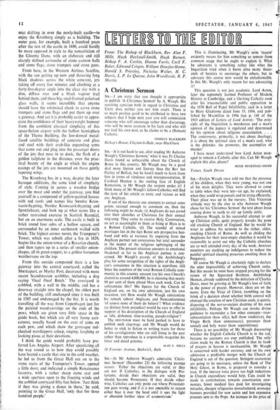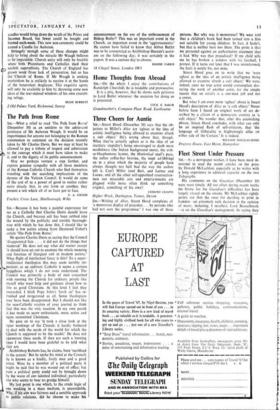SIR,—Evelyn Waugh once told me that the presence of his
children, when they were young, was not one of his main delights. They were allowed to come to table when they were ten—an age, he explained, when they could wrap parcels and tie string efficiently. Their place was up in the nursery. This Victorian attitude may be the clue to why Auberon Waugh chose for his 'Christmas Sermon' the text about Jesus coming down to earth to stir up family strife.
Auberon Waugh, in his successful attempt to stir up Christian strife, quite properly knocks the poor old creaking Church of England. But he would be wiser to address his sermons to the richer, older, creaking Church of Rome. As well as chiding the Anglicans for their near-empty churches it would be reasonable to point out why the Catholic churches are so well attended every day of the week. Anxious members are stacking up indulgences to reduce the painful spiritual cleaning processes awaiting them in Purgatory.
Of course Mr Waugh is absolutely right to declare the utter impossibility of achieving Church unity. But this means he must have stopped praying for the Wa" return of the Separated Brethren. Archbishop Heenan, already saddened by the defection of Charles Davis, must be grieving at Mr Waugh's loss of faith in the power of prayer. However, ideas are on the move. Even the Vicar of Christ, trembling on the brink of a decision about whether birth control will obstruct the creation of new Christian souls, is quietly disposing of the not-so-ancient doctrine of his own infallibility. Perhaps Mr Waugh can invoke divine guidance to reconsider a few other concepts—tran- substantiation (how silly), hell (how vindictive), the Virgin Birth (how unnecessary), penances (hoW sexual) and holy water (how superstitious).
There is no possibility of Mr Waugh discovering' whether the English Catholic Church is in the red;'
because no accounts are ever published. The on1S+) claim made by the Roman Church is that its bang of prayers in heaven is inexhaustible. Mr Waugh' is concerned with harder currency and on his owfit admission a profitable merger with the Church of England is out of the question. Stringent economies are going to be necessary, unless the Bank of The Holy Ghost, in Rome, is prepared to consider a' loan. If the interest rates prove too high-reductions in Church expenditure would help. Cuts could be made in contributions towards canonisation cere- monies, fewer medical fees paid for investigating miracles, cheaper reliquaries manufactured, economy banners provided for new saints and less expensive presents sent to the Pope. An increase in the price of
candles would bring down the wrath of the Prices and Incomes Board, but fewer could be bought and burned eachmweek-, This new non-ceremony could be named a Candle for Auberon.
Strangely 'enough some of these changes might help to bring about the miracle Mr Waugh believes to be impossible. Church unity will only be feasible when' both Protestants and Catholics shed their ancient superstitions. The Church of England has grown weak from lack of persecution, but so has the 'Church of Rome. If Mr Waugh is seeking martyrdom he is unlikely to receive it at the hands of the benevolent Anglicans. This exquisite agony will only be available to him by throwing some new ideas at the tear-stained windows of his own crumbl- ing refuge.
HUGH BURNETT
2 Old Palace Yard, Richmond, Surrey































 Previous page
Previous page